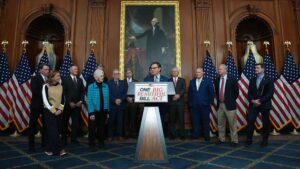Understanding the "One Big Beautiful Bill Act": Potential Impacts on Your Finances
As we navigate the complex landscape of personal finance, recent developments in U.S. legislation have introduced significant changes that could affect household budgets across the nation. House Republicans have proposed a multi-trillion-dollar tax and spending package, known as the "One Big Beautiful Bill Act." If enacted, this legislation would revamp several financial aspects that could resonate profoundly with your wallet. Here at Extreme Investor Network, we break down these potential changes, providing insights that go beyond the headlines.
Higher SALT Deduction Limits
One of the most talked-about proposals is the increase in the state and local tax (SALT) deduction cap. Currently set at $10,000, the new bill aims to raise this cap to $40,000 in 2025, phasing out for incomes above $500,000. This move could benefit wealthier earners significantly, but it also brings complexities for those in the 37% tax bracket. If you primarily itemize deductions, it’s crucial to consider how these changes could impact your tax filing strategy.
Our Tip: If you’re in a high-tax state, it may be worth consulting a tax advisor to understand how these changes could affect your long-term financial planning.
Expanded Child Tax Credit
The child tax credit, temporarily raised to $2,000 under Trump’s 2017 tax cuts, could become a permanent fixture, with an increase to $2,500 set to last from 2025 to 2028. However, this does little to assist the approximately 17 million children currently ineligible for the credit due to low-income tax obligations. Families in the lower income brackets may still find themselves overlooked, a reminder of the complexities within tax legislation.
Action Step: Look into tax credits you may not be aware of. Programs vary by state, and local initiatives could fill gaps left by federal policy.
Cuts to Medicaid and SNAP
To finance the proposed tax relief, the bill suggests up to $1 trillion in cuts to crucial support programs like Medicaid and SNAP, which serve millions of Americans. Stricter work requirements may lead to an estimated 14 million losing health coverage and 3 million households unable to receive food assistance.
Stay Informed: Advocacy work or community programs may offer resources for those set to be affected. Understanding your options can help you navigate this potential financial pinch.
New Tax Deductions for Seniors
On a more positive note, the proposed bill includes a "bonus" tax deduction for seniors aged 65 and up, allowing for an additional $4,000 deduction. This boosts the overall tax benefit for low- to middle-income seniors, but it comes at the cost of not eliminating taxes on Social Security benefits—a proposal that some felt would have provided greater relief.
Our Take: If you’re a senior citizen or have aging family members, learn about this new deduction and how it might reduce your tax burden significantly.
Health Savings Account Overhaul
The proposed legislation seeks to enhance contributions to Health Savings Accounts (HSAs), allowing families to contribute up to $17,100 annually. Starting in 2026, you will also be able to use HSA funds for fitness expenses, promoting a proactive approach to health and fiscal responsibility.
Pro Tip: If eligible, consider maximizing your HSA contributions. Not only do HSAs provide tax savings, but they also promote health and wellness—an investment in your future.
Introducing "Trump Accounts" for Young Savers
The bill introduces “Trump Accounts,” which provide a $1,000 initial deposit from the government for child savings. Parents could then contribute up to $5,000 annually, all aimed at funding education, first homes, or small business ventures.
Take Advantage: Teaching financial literacy to the next generation can have long-lasting effects. Setting up these accounts could be an essential step in fostering financial independence for your children.
The Impact on Student Loans
The proposed elimination of subsidized federal student loans may increase students’ financial burdens significantly. This change could raise their debt load by about 15% at graduation. Moreover, changes to income-driven repayment plans could extend terms to 30 years, leaving many feeling trapped under debt.
Stay Ahead: If you’re a student or managing loans for someone else, keep an eye on developments regarding repayment plans. Consider exploring refinancing options or alternative programs to lessen the financial impact.
Car Loan Interest Deductions and Other Benefits
New provisions allow for a potential deduction of up to $10,000 for interest on car loans for tax years 2025-2028, and workers who receive tips may benefit from tax breaks as well. However, restrictions apply; ensure you’re aware of your eligibility.
Budget Smart: As auto financing can be a long-term commitment, consider planning and budgeting for potential tax benefits when purchasing a vehicle.
Conclusion
As with any financial legislation, the “One Big Beautiful Bill Act” presents both opportunities and challenges. Understanding the nuances of this proposed bill can help you prepare for its potential impact on your finances. We at Extreme Investor Network encourage you to stay informed, seek personalized advice, and adjust your financial strategies accordingly. Your financial future may depend on it!

